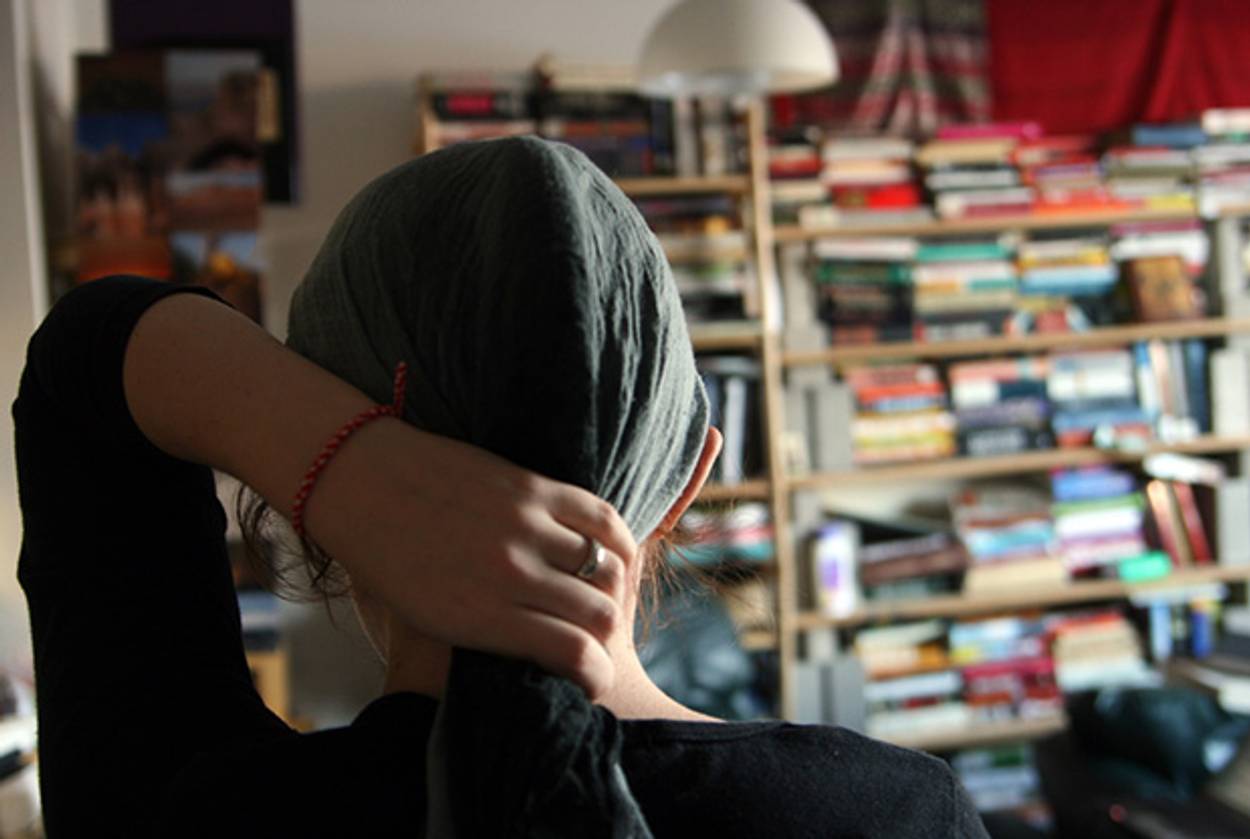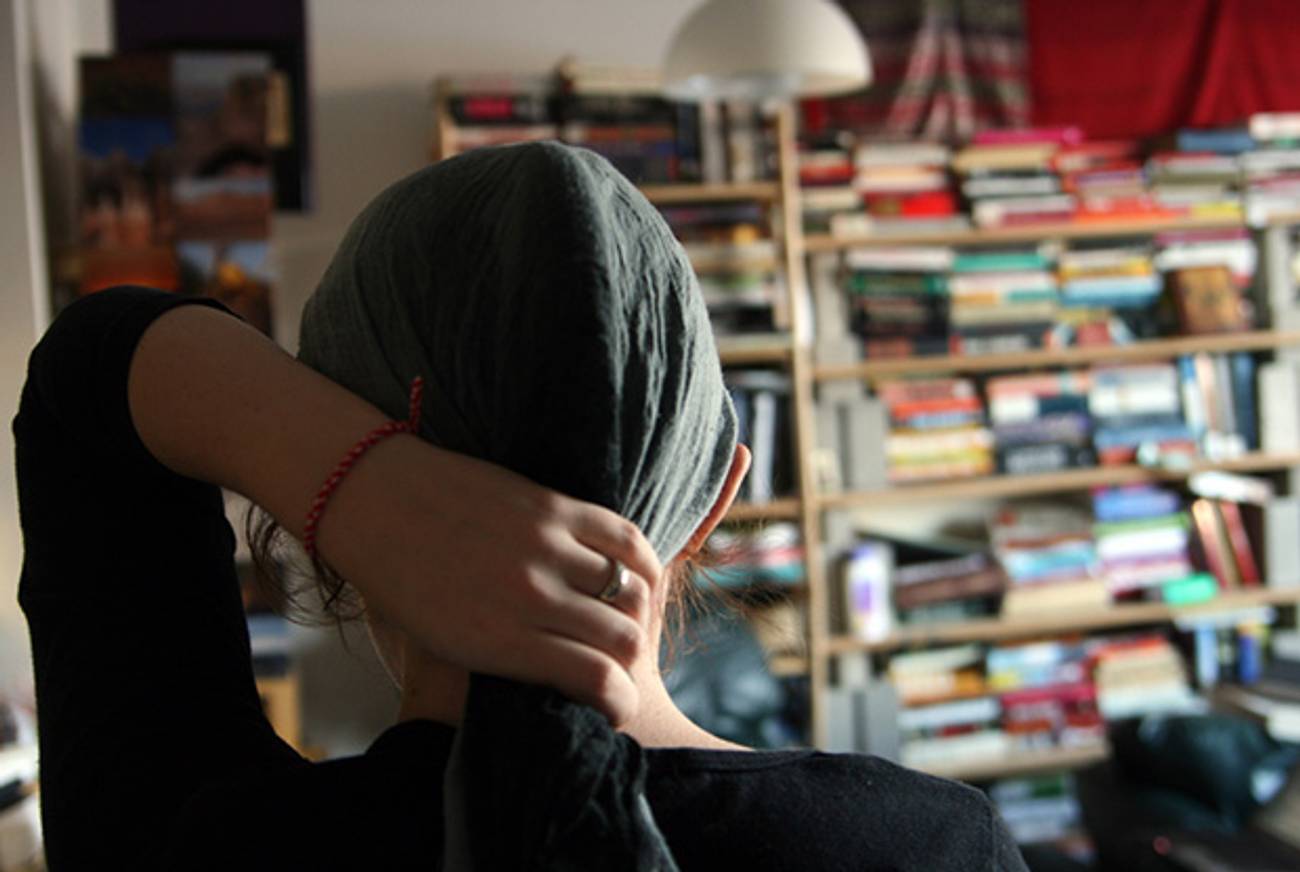An Object of Desire?
As an Orthodox woman, I relish the freedom from ogling that modest dress offers—but it’s nice to be admired




I arrived at a café in L.A. for my monthly writing group last spring and walked to the counter to order tea and a slice of cake. As I headed back to the table, I noticed one of the other patrons watching me as I walked past him. A few minutes later, as I shared the short story I had written with the other four women in the group, I noticed the same young man glancing my way again. And then again.
I assumed that my elaborately wrapped, sparkly headscarf and gold ring clearly marked me as married; yet, there he was, looking my way.
At first, the man’s stare left me indignant. How dare he look my way. I’m a married woman! I thought of my husband, the only man whose attention I intentionally attract, and felt jealous on his behalf.
A few minutes passed. A couple more stealthy looks my way. And then I thought: A nice-looking guy at least five years younger can’t seem to keep his eyes off me. Not too shabby. I felt myself sit up straighter, speak with more self-confidence.
A friend joined the stranger at his table, and my “admirer” pulled out his laptop, to show his friend something on the screen. My meeting continued, one writer sharing after the next. Again and again, I noticed that man looking my way, but I tried to ignore it—until an hour later, when I had to reach across the table to take a packet of papers from the last woman scheduled to share her writing. At that point, I noticed he wasn’t staring at me at all. The object of his longing was the electric socket right behind me—the only one in the café. The moment my group stood up from the table, he rushed over and plugged in his laptop, without one more look in my direction. I was relieved, but also mortified.
Over the next couple weeks, I told this story again and again, inviting my friends to laugh at me. Perhaps, I thought, if I made light of the situation, I wouldn’t have to think about what had been really going on that night in that café, inside my head. If I thought too hard about my behavior, I worried that I might discover something akin to unfaithfulness lying behind it.
How had I reached that point? There I was, a very happily married woman, an Orthodox woman who holds modesty as a lofty virtue, yet some part of me had enjoyed the idea that a stranger might watch me. It took me a while to realize that my reaction reflected less on my husband and the state of our marriage than on my own longstanding anxieties.
*
As a teenager, before I became Orthodox, I was never one of the pretty girls. Deeply insecure about my looks, I both wanted attention and dreaded it. What if boys looked at me, but didn’t find me beautiful? Self-conscious about my developing figure, I hid in the jeans-and-flannel-shirt uniform of grunge. I spent lunch period with the freaks and geeks in the library at my public high school, never attended a school dance, never went on dates.
I was an active member of USY, the youth arm of the Conservative movement, where I wasn’t popular but at least I felt like I belonged. The singing, learning, and social programming helped me structure my otherwise empty social life.
My transformation at 20 into a woman who was attractive, if not precisely pretty, was a happy surprise. I ditched the giant plastic eyeglasses I’d worn since the 1980s and stopped dressing like a Nirvana groupie. My skin cleared up to an even, creamy tone. At last, men noticed me! They complimented my blue eyes, smooth skin, and curly hair, and finally asked me out—not often, but often enough.
But the funny thing about attention is that you can’t filter out the kind you want from the kind that is unwanted. Just after my 21st birthday, I complained to a girlfriend, originally from Italy, about a construction worker whistling at me on a street corner in D.C.
“You Americans!” she told me. “Take it as a compliment. He approved of the goods.”
“I don’t feel admired—I feel used,” I said. She rolled her eyes. Crazy Americans.
On a separate occasion, I went jogging on a hot day in a sports bra and bike shorts. A car slowed to pace me down the block, then followed me as I wove in and out of streets. After I joined a crowd of people, the car drove off, leaving me shaking and relieved.
Around this time, I slowly started to migrate toward an observant lifestyle. The comfort I had felt at USY events had encouraged me to investigate Judaism further. I began to attend an Orthodox synagogue and reading books, and I found the answers and the community I sought. I tightened up my Shabbat observance, started eating only in kosher restaurants, and skipped work on Jewish holidays.
My family was a bit startled by my transformation, but generally supportive. I have cousins who are religious, and if I was going to do something “crazy,” this seemed preferable to becoming a druggie or dropping out of college. So when I began to wear exclusively skirts, always at least three inches below the knee and never with a slit, and my blouses reached my collarbone and covered my elbows even in August, there was no protest.
A few years back, I heard an interview on NPR of a journalist who had reported from Afghanistan. She confessed that traveling behind a burka had been liberating for her. No longer did men have unrestricted permission to look at her. Like that journalist in the burka, I enjoyed the refreshing feeling of freedom modest dress brought me. When I interacted with men, they now made eye contact and paid attention to what I said.
*
A dozen years later, married with a few kids, I now cover my hair daily with a hat or headscarf. My modest dress helps me stay inward-focused: on developing a relationship with G-d, on refining my character, and on connecting to people on a soul-level.
And yet.
About a month prior to the incident in the café, I turned 36. I noticed My first wrinkle the week of my birthday. Suddenly, 40—even old age—loomed over me. What once seemed impossible became inevitable.
A gloom descended over me. In the synagogue and community events I no longer qualified as either a “young professional” or a “young married.” I was officially over the hill. The mirror confirmed my transformation. Deep down, I believed my looks had peaked. I didn’t look like someone’s girlfriend; I looked like someone’s mother—maybe even my own.
I complained to my sister, to a neighbor, to my best friend. My husband assured me that I was still beautiful. On the other hand, he freely admitted that when he looked at me, he no longer saw just the surface.
That’s when I realized that part of me hoped that someone might still admire my surface.
When I shared this incident at a writing workshop, Sarah Shapiro—the instructor and an extraordinary writer—laughed. Back in the 1980s, a neighbor had reassured her in the name of a prominent rabbi that a woman’s desire to be beautiful is so strong that her soul will rise above her grave, watching the gravedigger, hoping that he is admiring the beauty of her corpse.
I laughed at that anecdote, but her words comforted me, too. My marriage wasn’t under threat. I wasn’t shameless or silly. I was vain, but I was normal.
The young girl who wanted boys to look at her, but was afraid of what they’d see, is still inside me. The mirror might tell me she’s grown up and gotten over her youthful concerns, but I know better.
***
Like this article? Sign up for our Daily Digest to get Tablet Magazine’s new content in your inbox each morning.
Rebecca Klempner is a wife, mother, and writer in Los Angeles.
Rebecca Klempner is a wife, mother, and writer in Los Angeles.